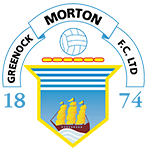McElhone: Hoppy is one of the country’s best
New Morton assistant boss Anton McElhone believes David Hopkin is one of the best managers in the country and says the incentive to work with him was what drew him back across the Atlantic and now to Cappielow.
The 38-year-old left New England Revolution to serve as Hopkin’s assistant manager at Bradford City last season and has accepted the invite to follow him to Greenock and resume the role of right-hand man here.
And former Hibernian and Tottenham sport scientist McElhone revealed that forming a management team with the new Ton boss had been in the pipeline long before they linked up at Valley Parade.
McElhone told www.gmfc.net: “I met the gaffer nine years ago. I was doing my B Licence down at Largs, and the gaffer was on the course.
“We get on well, developed a good friendship, had similar beliefs, and kept in touch over the years. When he was at Morton and I was at Tottenham, I used to help out with player recommendations.
“He’s a very, very good coach. One of the best managers in the country. He is successful, knows how to manage people, knows how to get results, and he develops players.
“The chance to go to America was a fantastic opportunity, but the opportunity wasn’t there to work with Hoppy at that stage. If that had come about before then I would have went and worked with Hoppy.
“That’s been something that’s been on the cards for a few years. We had spoken about it, and it was just about getting the timing right.
“There were family reasons to return to Scotland, but the chance to work with him at Bradford was a big incentive to come back from America. I want to work with the best and that’s why I’ve come to work with him.”
Holding a bachelor’s degree in sports studies with exercise science and a master’s in strength and conditioning, McElhone specialises in player performance and fitness.
However, he always held an ambition to combine his area of expertise with a coaching role within a senior football club, which Hopkin offered.
McElhone explained: “I had started at as a coach and then went into the fitness industry to try and climb the ladder with an eye on coming back to coaching at some point in my career.
“I played pro-youth football with Queen’s Park and went to college at 18 to do coaching and returned to Queen’s Park and worked with their Under-13s.
“I then went to Hibs with John Park and was there for two years, and it was then that I went full-time as a sports scientist because I was going through my studies at college and university.
“I worked with some great managers there in Tony Mowbray, John Collins and then again at Tottenham. It was at 30 that I decided to go and do my coaching badges and get back into coaching, which never left me.
“The gaffer obviously gave me that opportunity to be his assistant at Bradford. The manager is the tactician, he’s the brains, he’s the boss and I compliment him, doing everything around that to help him.
“That includes planning training, planning fitness, planning pre-season, helping with analysis. That was my role at New England: I was integrated into the coaching staff and part of technical and tactical meetings.
“In the modern day, it’s becoming more and more common to see guys like Ian Cathro who didn’t play the professional game, but came through different routes to work in football.
“So obviously I’m not the typical previous assistant manager at the club, but I offer insights into a multitude of different areas.”
When asked what impact he wants to make at Cappielow on a personal level, he replied: “What we want is fit, high energy, high-intensity players first and foremost. You saw that with the manager’s team at Livingston.
“Look at Andy Robertson. He got released by Celtic, went to Queen’s Park in the bottom division, and is now going to his second Champions League final. If you’ve got energy, will, and desire, you can achieve so much
“The way we are going to play is high-energy, pressing, in your face, we want to dictate – listen, we want to win football games.
“We also need to have a fit team with as many players as possible available every week, because if the manager has the best players available every week, he has more chance of winning.
“It doesn’t matter what money we’ve got. We have expertise in the manager, myself, and the other staff, and we want to be a force.”
Despite spending most of his career working down south and abroad, McElhone is no stranger to the club and explained: “I used to come up to Morton when the gaffer was the reserve team manager.
“I’d come up, watch some games and have a chat with him. It was always one of those things that at one point in life he wanted to come to Morton to where it should be, in the Premiership.”
Image: Jonathan Mitchell


